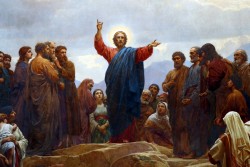
I got word this week that the paper I proposed for the Matthew section at this year’s annual meeting of the Society of Biblical Literature was accepted. Here’s the abstract:
Jesus’ Teaching on the Law, Deuteronomic Concessions and Eschatological Righteousness: A Re-examination of the Teaching on Divorce and Remarriage in Matthew 5:31–32
In the Sermon on the Mount we find Matthew’s most explicit account of Jesus’ teaching about his relationship to the Law. However, as is well known, Matthew’s report of Jesus’ teaching is particularly difficult to follow. In 5:17, Jesus insists that he has not come to “abolish” the Torah. Yet the teachings that immediately follow this, the so-called “antitheses” (5:21–48), appear to do just that, i.e., they appear to nullify the Law. While some of the antitheses may be understood in terms of an intensification of the demands of the Torah (e.g., lust as adultery in 5:27–30), others are harder to explain along those lines. One particularly notable example is Jesus’ equation of divorce and remarriage with adultery (5:31–32). The Law in fact allows for divorce and remarriage (cf. Deut 24:1–4). It is difficult then to see Jesus’ teaching on this matter as merely an intensification of the Law’s requirements; Jesus is here explicitly prohibiting something the Torah clearly permits! Is there any way to explain this apparent problem? This paper proposes a solution. As many Old Testament scholars now recognize (e.g., Goldingay), Deuteronomy appears to have been understood as a kind of “lower law”, making concessions that are absent in the previous covenant legislation (e.g., profane slaughter, cf. Deut 12:15–25 with Lev 17:1–4). In fact, recently some have demonstrated that it is likely Ezekiel had precisely these types of concessions in view when he declared that God gave Israel “laws that were not good” (Ezek 20:25; Hahn, Bergsma). Is Matthew’s Jesus aware that certain laws were seen as concessions to sinfulness? Did he therefore expect to reinstitute the stricter standards of holiness they abrogated? Here we may find an important key that helps to better explicate Jesus’ view of Torah-righteousness in Matthew 5.
The paper builds upon work I did in a section of my dissertation, which analyzed Jesus’ view of the cult in the Sermon on the Mount.
I am grateful for the opportunity to present this paper and I looking forward to the conference. I have not yet heard who else is on the panel or what other papers will be read.